Unit 4 Problems and advice 第3课时Grammar课件
文档属性
| 名称 | Unit 4 Problems and advice 第3课时Grammar课件 |  | |
| 格式 | pptx | ||
| 文件大小 | 6.0MB | ||
| 资源类型 | 试卷 | ||
| 版本资源 | 牛津深圳版 | ||
| 科目 | 英语 | ||
| 更新时间 | 2022-09-09 10:58:39 | ||
图片预览



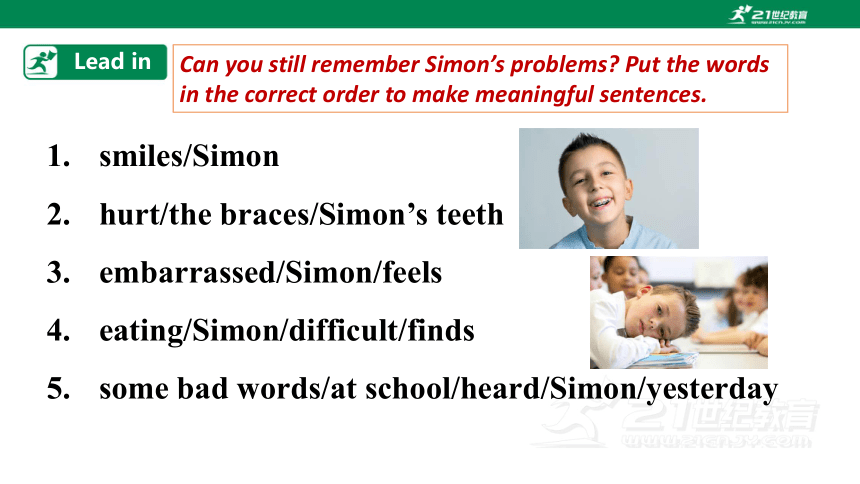
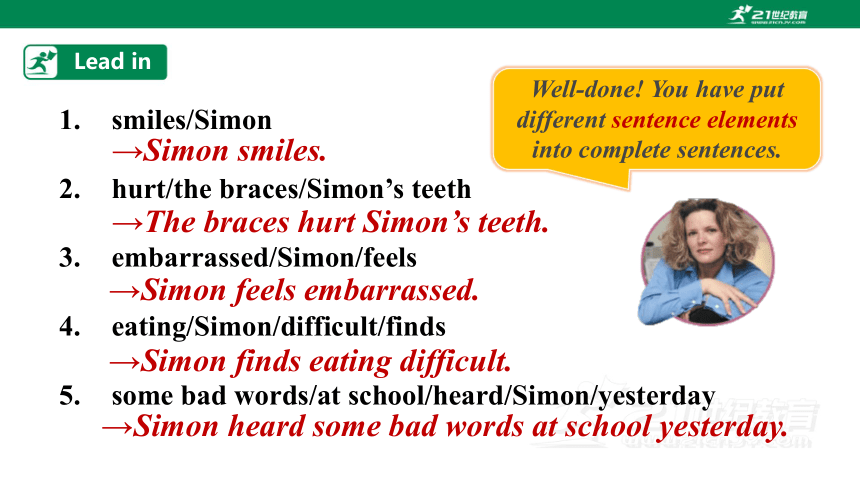
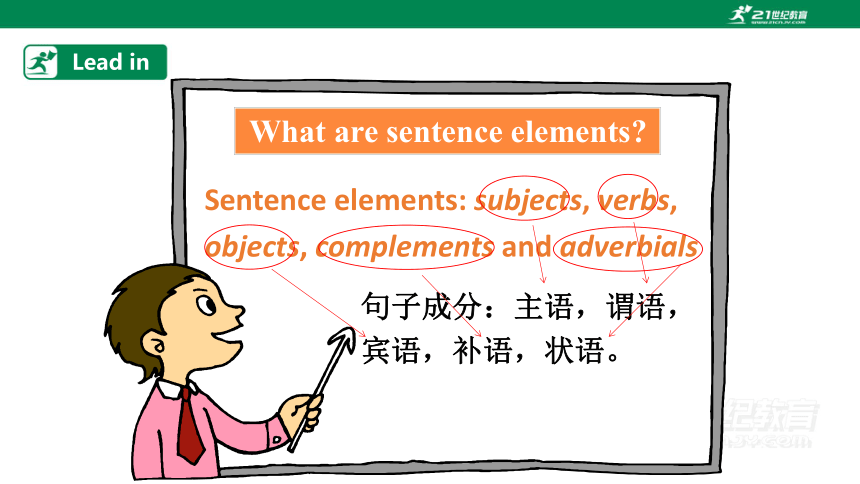
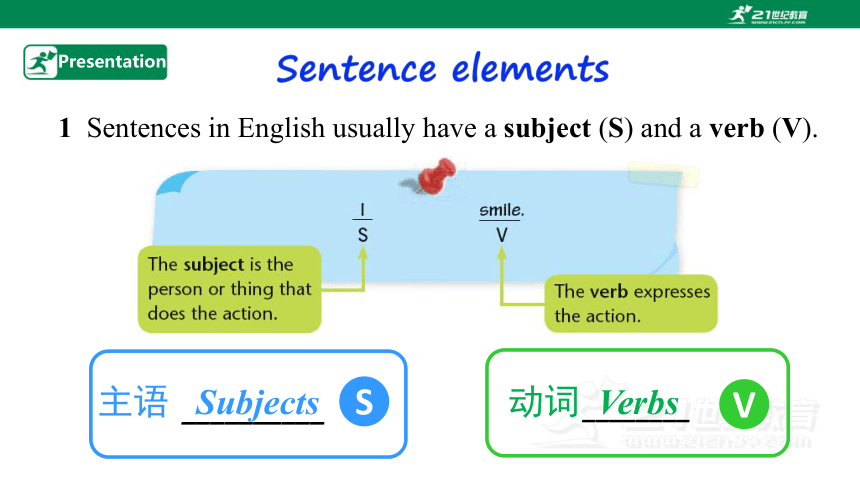
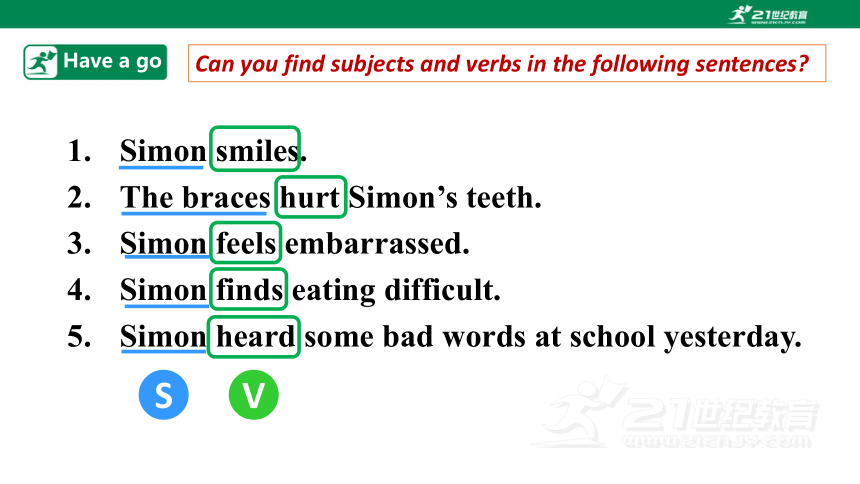

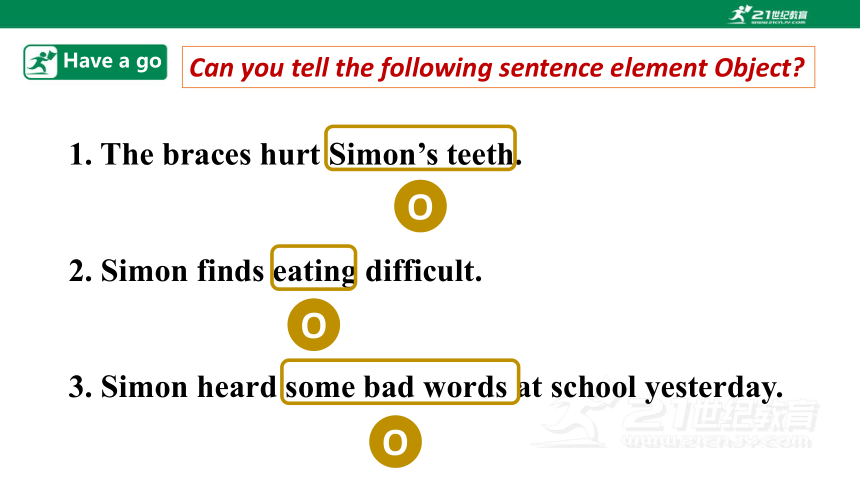
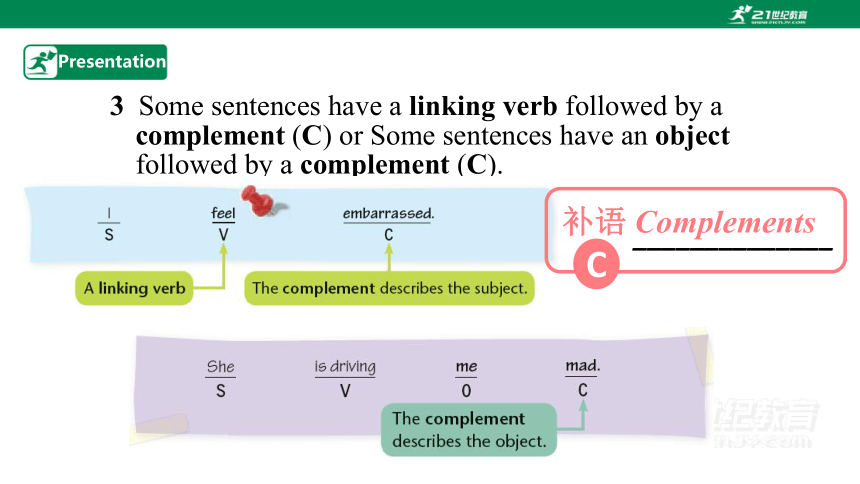
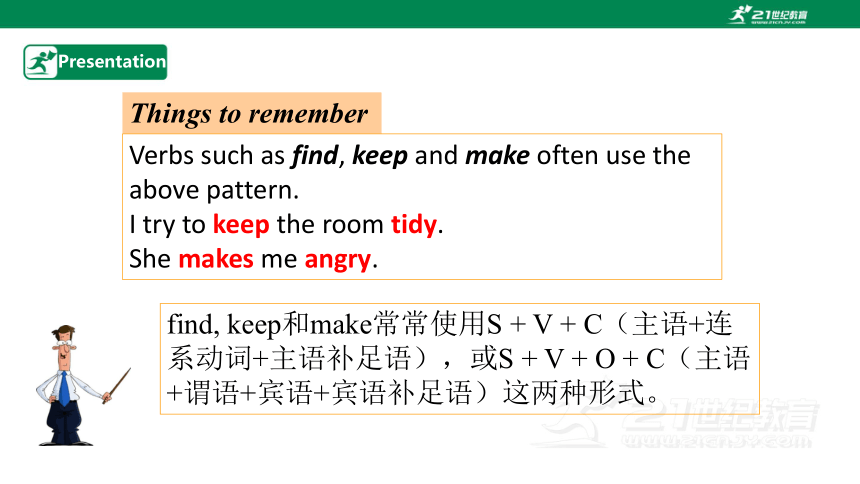
文档简介
(共43张PPT)
Unit 2 Problems and advice
Period 3 Grammar
牛津深圳·广州版 九年级上
1. Knowledge objectives: Master some sentence elements: subject, object, predicate, predicative, object complement. etc.
2. Skill objectives: Be able to understand the meaning of a sentence by distinguishing its components and analyzing its structure.
3. Emotional objectives: Develop students’ sense of cooperative learning and individual capability.
4. Thinking quality objectives: Analyze and summarize the structure and usage of infinitives, and draw inferences from one instance by using grammatical rules.
Learning objects
I am very busy these days.
Can you help me reply to the letters
Make sure your sentences are correct!
Lead in
Can you still remember Simon’s problems Put the words in the correct order to make meaningful sentences.
smiles/Simon
hurt/the braces/Simon’s teeth
embarrassed/Simon/feels
eating/Simon/difficult/finds
some bad words/at school/heard/Simon/yesterday
Lead in
smiles/Simon
hurt/the braces/Simon’s teeth
embarrassed/Simon/feels
eating/Simon/difficult/finds
some bad words/at school/heard/Simon/yesterday
→Simon smiles.
→The braces hurt Simon’s teeth.
→Simon feels embarrassed.
→Simon finds eating difficult.
→Simon heard some bad words at school yesterday.
Well-done! You have put different sentence elements into complete sentences.
Lead in
Lead in
What are sentence elements
Sentence elements: subjects, verbs, objects, complements and adverbials
句子成分:主语,谓语,宾语,补语,状语。
1 Sentences in English usually have a subject (S) and a verb (V).
Presentation
Sentence elements
________
动词 Verbs
V
__________
主语 Subjects
S
Simon smiles.
The braces hurt Simon’s teeth.
Simon feels embarrassed.
Simon finds eating difficult.
Simon heard some bad words at school yesterday.
Can you find subjects and verbs in the following sentences
S
V
Have a go
2 Some sentences also have an object (O).
Presentation
__________
宾语 Objects
O
1. The braces hurt Simon’s teeth.
2. Simon finds eating difficult.
3. Simon heard some bad words at school yesterday.
Can you tell the following sentence element Object
O
O
O
Have a go
3 Some sentences have a linking verb followed by a complement (C) or Some sentences have an object followed by a complement (C).
Presentation
______________
补语 Complements
C
Things to remember
Verbs such as find, keep and make often use the above pattern.
I try to keep the room tidy.
She makes me angry.
find, keep和make常常使用S + V + C(主语+连系动词+主语补足语),或S + V + O + C(主语+谓语+宾语+宾语补足语)这两种形式。
Presentation
4 Some sentences have an adverbial (A).
Presentation
_____________
状语 Adverbials
A
Can you tell their sentence elements
Anna’s friend gets thin.
Peter’s friends laughed.
Julie’s sister is driving her mad.
Ben didn’t help the young boy on the train.
S
S
S
S
LV
V
C
O
O
A
C
V
V
Have a go
Presentation
_______________
直接宾语 Direct object
5 Sentences with verbs such as give, bring, buy and send can have a direct object (DO) and an indirect object (IO).
DO
_______________
间接宾语 Indirect object
IO
Things to remember
When the indirect object comes after the direct object, to or for is used.
The braces have brought so much trouble to me.
下列动词后用to:bring,feed,give,hand,lend,offer,pass,pay,post,sell,send,show,take,teach,tell,write。
下列动词后用for:book,buy,choose,cook,fetch,leave,make,order,pick,reserve,save。
Presentation
V
S
IO
DO
Try to complete the following advice with to or for .
Simon should pay less attention ________ his friends.
Anna can cook some healthy food ________ Jolin.
Peter’s friends should show respect ________ the lady.
Julie can lend her things ________ her sister
only if her sister asks her first.
to
for
to
to
Have a go
IO
DO
DO
DO
DO
IO
IO
IO
① Tom is a junior high school student.
(Tom, junior high school student, be) He __________________________________. (best friends, visit, every weekend) One of them is a boy called Alex.
visits his best friends every weekend
Look at the pictures plete the sentences with the words in brackets. Add other words if necessary.
Have a go
② Last weekend,_________________________
_____________________________________.
(Alex, some new books, showed, Tom, in his flat) Suddenly Alex knocked a flowerpot out of his window by accident. This___________________.
(them, made, worried)
Alex showed some new books to Tom in his flat
made them worried
Have a go
③ Luckily, no one was hurt by the flowerpot.
Then______________________________.
(for, went out, an hour, Alex and Tom)
Alex and Tom went out for an hour
Have a go
④Alex and Tom ____________________________. (later that afternoon, returned) They saw a policeman questioning a boy about the broken flowerpot. They _______________(very bad, felt), but they did not know what to do.
returned later that afternoon
felt very bad
Have a go
What will happen next
Can you help Aunt Linda to reply to Tom
Try to make use of what you have learned in this lesson.
Dear Tom,
You felt ashamed of what happened. And I believe you have learnt an important lesson. I think you should tell the truth to the police.
Yours,
Linda
Have a go
1.
2.
3.
4.
5.
V
S
V
S
O
V
S
O
C
IO
DO
S
V
V
S
C
主+谓
主+谓+宾
主+系+表
主+谓+宾+宾补
主+谓+间宾+直宾
Summary
Sentence structures
Summary
Sentence elements
句子所要描述人或事物,通常来说位于句首。
主语 subject
陈述或说明主语的动作或状态,通常放在主语的后面。
动作所涉及的对象,位于及物动词的后面。
宾语 object
修饰、限定、说明名词或代词的品质与特征。
定语 attribute
修饰动词、形容词、副词或者整个句子等。
状语 adverbial
补充说明宾语或者主语的行为、状态、身份、特征等。
宾补object complement
谓语 predicate
表语 predicative
说明主语的身份、性质、品性、特征和状态,常常位于系动词之后。
主语 (Subject)
表示句子说的是什么人或什么事。是一个句子所叙述的主体,一般位于句首。但在there be结构、疑问句(当主语不是疑词时)和倒装句中,主语位于谓语、助动词或情态动词后面。主语可由名词、代词、数词、不定式、动词ing、名词化的形容词和主语从句等表示。
Summary
1. The flowers are very beautiful.
2. He runs very quickly.
3. Eight is a lucky number in China.
4. The old should be looked after well.
5. To finish your homework everyday is necessary.
6. Reading is my hobby.
7. Listening to others is important.
8. Why he came here last night is another question.
Summary
谓语 (Verbs)
说明主语所做的动作或具有的特征和状态。动词在句中作谓语,一般放在主语之后,它有人称、数、时态和语态的变化。
1. He admires his father very much.
2. They get on well with each other.
3. She lost her mother forever.
4. The window was broken last night.
Summary
表语(Predicative)
用以说明主语的性质、特征、状态与身份,它一般位于系动词(如be, become, get, look, grow, turn, seem等)之后。表语一般由名词、代词、形容词、数词、 副词、不定式、动词ing、分词、介词短语及表语从句表示。
Summary
1. I am a teacher.
2. The book is mine.
3. She feels much better today.
4. The number of the students in my class is 50.
5. He was abroad last summer.
6. He is not at home.
7. My hobby is reading.
8. His dream is to become a basketball player.
9. The question is when we can arrive at the hotel.
Summary
宾语(Object)
表示动作的对象或承受者,一般位于及物动词和介词后面。 宾语一般是由名词、代词、数词、名词化的形容词、不定式、动名词和句子等来充当的。
Summary
1. Many girls love beautiful flowers.
2. Surprisingly, the bear didn't attack him.
3. She likes the second.
4. We can't ignore the poor.
5. She refused to go with him.
6. I enjoy listening to music.
7. I want to know where she bought that valuable book.
Summary
宾语补足语(Object Complement)
用于补充说明宾语的动作,一般位于宾语之后,宾语与宾语补足语一起构成复合宾语。需接复合宾语的动词有:tell,let,help,teach, ask,see,have,order,make等。“宾补”一般可由名词、形容词、副词、不定式、分词、介词短语和从句充当。
Summary
1.We elected Lucy our monitor yesterday.
2. She finds the book interesting.
3. Let's get the meeting over.
4. We met a lion in trouble.
5. My mother often tells me to work hard at school.
6. Can you hear someone singing in the next room
Summary
定语(attribute)
通常是由名词、形容词、代词、数词、介词短语、非谓语动词、从句等来充当,用来修饰、限定、说明名词或代词的品质与特征。
作定语的词,通常要放在它所修饰的词之前,作为前置定语;短语或者从句作定语的时候,常要放在它所修饰的词之后,作为后置定语。
Summary
1. It took me a long time to get to the train station.
2. He is one of my best friends.
3. There are 5 monitors in my class.
4. I can't imagine a world without trees.
5. She paid no attention to the burning clothes.
6. I have something to say.
7. The girl who is always cheerful helps many people in her daily life.
Summary
状语(Adverbial)
状语一般是由副词、介词短语、非谓语动词或者从句来充当,用来修饰动词、形容词、副词或者整个句子等,说明时间、地点、原因、条件、目的、结果、让步、方式和比较等。大家需要注意的是,不同的状语出现在句子中的位置也不同。
Summary
Summary
1. He can speak English very well.
2. There is a stature on the square.
3. In order to save water, he takes a shower instead of taking a bath.
4. Being ill, he didn't finish his homework yesterday.
5. When I was a little girl, I dreamed of becoming a princess.
I enjoy Chinese ancient poems. ( )
Mrs. White is a German. ( )
Did you sleep well ( )
I consider him a wise leader. ( )
Swimming can help keep healthy. ( )
His job is to look after these patients. ( )
The weather suddenly got cold. ( )
She doesn’t like Japanese food. ( )
表语/主语补足语
宾语
一、写出下列各句划线部分在句中所作的句子成分。
Exercise
状语
宾语补足语
主语
表语/主语补足语
表语/主语补足语
谓语
S + V
S + V + O
S + V + O + C
S + V + A
S + V + IO + DO
That job drove me crazy.
I agree.
She will come at 10 p.m.
I had some meat.
I’ve made you some more tea.
二、请找出各句的句子结构。
Exercise
Homework
Finish Grammar exercise paper.
A man of words an not of deeds is like a garden full of weeds.
Reflection
光说空话不做事,犹如花园光长刺。
谢谢
21世纪教育网(www.21cnjy.com)
中小学教育资源网站
兼职招聘:
https://www.21cnjy.com/recruitment/home/admin
Unit 2 Problems and advice
Period 3 Grammar
牛津深圳·广州版 九年级上
1. Knowledge objectives: Master some sentence elements: subject, object, predicate, predicative, object complement. etc.
2. Skill objectives: Be able to understand the meaning of a sentence by distinguishing its components and analyzing its structure.
3. Emotional objectives: Develop students’ sense of cooperative learning and individual capability.
4. Thinking quality objectives: Analyze and summarize the structure and usage of infinitives, and draw inferences from one instance by using grammatical rules.
Learning objects
I am very busy these days.
Can you help me reply to the letters
Make sure your sentences are correct!
Lead in
Can you still remember Simon’s problems Put the words in the correct order to make meaningful sentences.
smiles/Simon
hurt/the braces/Simon’s teeth
embarrassed/Simon/feels
eating/Simon/difficult/finds
some bad words/at school/heard/Simon/yesterday
Lead in
smiles/Simon
hurt/the braces/Simon’s teeth
embarrassed/Simon/feels
eating/Simon/difficult/finds
some bad words/at school/heard/Simon/yesterday
→Simon smiles.
→The braces hurt Simon’s teeth.
→Simon feels embarrassed.
→Simon finds eating difficult.
→Simon heard some bad words at school yesterday.
Well-done! You have put different sentence elements into complete sentences.
Lead in
Lead in
What are sentence elements
Sentence elements: subjects, verbs, objects, complements and adverbials
句子成分:主语,谓语,宾语,补语,状语。
1 Sentences in English usually have a subject (S) and a verb (V).
Presentation
Sentence elements
________
动词 Verbs
V
__________
主语 Subjects
S
Simon smiles.
The braces hurt Simon’s teeth.
Simon feels embarrassed.
Simon finds eating difficult.
Simon heard some bad words at school yesterday.
Can you find subjects and verbs in the following sentences
S
V
Have a go
2 Some sentences also have an object (O).
Presentation
__________
宾语 Objects
O
1. The braces hurt Simon’s teeth.
2. Simon finds eating difficult.
3. Simon heard some bad words at school yesterday.
Can you tell the following sentence element Object
O
O
O
Have a go
3 Some sentences have a linking verb followed by a complement (C) or Some sentences have an object followed by a complement (C).
Presentation
______________
补语 Complements
C
Things to remember
Verbs such as find, keep and make often use the above pattern.
I try to keep the room tidy.
She makes me angry.
find, keep和make常常使用S + V + C(主语+连系动词+主语补足语),或S + V + O + C(主语+谓语+宾语+宾语补足语)这两种形式。
Presentation
4 Some sentences have an adverbial (A).
Presentation
_____________
状语 Adverbials
A
Can you tell their sentence elements
Anna’s friend gets thin.
Peter’s friends laughed.
Julie’s sister is driving her mad.
Ben didn’t help the young boy on the train.
S
S
S
S
LV
V
C
O
O
A
C
V
V
Have a go
Presentation
_______________
直接宾语 Direct object
5 Sentences with verbs such as give, bring, buy and send can have a direct object (DO) and an indirect object (IO).
DO
_______________
间接宾语 Indirect object
IO
Things to remember
When the indirect object comes after the direct object, to or for is used.
The braces have brought so much trouble to me.
下列动词后用to:bring,feed,give,hand,lend,offer,pass,pay,post,sell,send,show,take,teach,tell,write。
下列动词后用for:book,buy,choose,cook,fetch,leave,make,order,pick,reserve,save。
Presentation
V
S
IO
DO
Try to complete the following advice with to or for .
Simon should pay less attention ________ his friends.
Anna can cook some healthy food ________ Jolin.
Peter’s friends should show respect ________ the lady.
Julie can lend her things ________ her sister
only if her sister asks her first.
to
for
to
to
Have a go
IO
DO
DO
DO
DO
IO
IO
IO
① Tom is a junior high school student.
(Tom, junior high school student, be) He __________________________________. (best friends, visit, every weekend) One of them is a boy called Alex.
visits his best friends every weekend
Look at the pictures plete the sentences with the words in brackets. Add other words if necessary.
Have a go
② Last weekend,_________________________
_____________________________________.
(Alex, some new books, showed, Tom, in his flat) Suddenly Alex knocked a flowerpot out of his window by accident. This___________________.
(them, made, worried)
Alex showed some new books to Tom in his flat
made them worried
Have a go
③ Luckily, no one was hurt by the flowerpot.
Then______________________________.
(for, went out, an hour, Alex and Tom)
Alex and Tom went out for an hour
Have a go
④Alex and Tom ____________________________. (later that afternoon, returned) They saw a policeman questioning a boy about the broken flowerpot. They _______________(very bad, felt), but they did not know what to do.
returned later that afternoon
felt very bad
Have a go
What will happen next
Can you help Aunt Linda to reply to Tom
Try to make use of what you have learned in this lesson.
Dear Tom,
You felt ashamed of what happened. And I believe you have learnt an important lesson. I think you should tell the truth to the police.
Yours,
Linda
Have a go
1.
2.
3.
4.
5.
V
S
V
S
O
V
S
O
C
IO
DO
S
V
V
S
C
主+谓
主+谓+宾
主+系+表
主+谓+宾+宾补
主+谓+间宾+直宾
Summary
Sentence structures
Summary
Sentence elements
句子所要描述人或事物,通常来说位于句首。
主语 subject
陈述或说明主语的动作或状态,通常放在主语的后面。
动作所涉及的对象,位于及物动词的后面。
宾语 object
修饰、限定、说明名词或代词的品质与特征。
定语 attribute
修饰动词、形容词、副词或者整个句子等。
状语 adverbial
补充说明宾语或者主语的行为、状态、身份、特征等。
宾补object complement
谓语 predicate
表语 predicative
说明主语的身份、性质、品性、特征和状态,常常位于系动词之后。
主语 (Subject)
表示句子说的是什么人或什么事。是一个句子所叙述的主体,一般位于句首。但在there be结构、疑问句(当主语不是疑词时)和倒装句中,主语位于谓语、助动词或情态动词后面。主语可由名词、代词、数词、不定式、动词ing、名词化的形容词和主语从句等表示。
Summary
1. The flowers are very beautiful.
2. He runs very quickly.
3. Eight is a lucky number in China.
4. The old should be looked after well.
5. To finish your homework everyday is necessary.
6. Reading is my hobby.
7. Listening to others is important.
8. Why he came here last night is another question.
Summary
谓语 (Verbs)
说明主语所做的动作或具有的特征和状态。动词在句中作谓语,一般放在主语之后,它有人称、数、时态和语态的变化。
1. He admires his father very much.
2. They get on well with each other.
3. She lost her mother forever.
4. The window was broken last night.
Summary
表语(Predicative)
用以说明主语的性质、特征、状态与身份,它一般位于系动词(如be, become, get, look, grow, turn, seem等)之后。表语一般由名词、代词、形容词、数词、 副词、不定式、动词ing、分词、介词短语及表语从句表示。
Summary
1. I am a teacher.
2. The book is mine.
3. She feels much better today.
4. The number of the students in my class is 50.
5. He was abroad last summer.
6. He is not at home.
7. My hobby is reading.
8. His dream is to become a basketball player.
9. The question is when we can arrive at the hotel.
Summary
宾语(Object)
表示动作的对象或承受者,一般位于及物动词和介词后面。 宾语一般是由名词、代词、数词、名词化的形容词、不定式、动名词和句子等来充当的。
Summary
1. Many girls love beautiful flowers.
2. Surprisingly, the bear didn't attack him.
3. She likes the second.
4. We can't ignore the poor.
5. She refused to go with him.
6. I enjoy listening to music.
7. I want to know where she bought that valuable book.
Summary
宾语补足语(Object Complement)
用于补充说明宾语的动作,一般位于宾语之后,宾语与宾语补足语一起构成复合宾语。需接复合宾语的动词有:tell,let,help,teach, ask,see,have,order,make等。“宾补”一般可由名词、形容词、副词、不定式、分词、介词短语和从句充当。
Summary
1.We elected Lucy our monitor yesterday.
2. She finds the book interesting.
3. Let's get the meeting over.
4. We met a lion in trouble.
5. My mother often tells me to work hard at school.
6. Can you hear someone singing in the next room
Summary
定语(attribute)
通常是由名词、形容词、代词、数词、介词短语、非谓语动词、从句等来充当,用来修饰、限定、说明名词或代词的品质与特征。
作定语的词,通常要放在它所修饰的词之前,作为前置定语;短语或者从句作定语的时候,常要放在它所修饰的词之后,作为后置定语。
Summary
1. It took me a long time to get to the train station.
2. He is one of my best friends.
3. There are 5 monitors in my class.
4. I can't imagine a world without trees.
5. She paid no attention to the burning clothes.
6. I have something to say.
7. The girl who is always cheerful helps many people in her daily life.
Summary
状语(Adverbial)
状语一般是由副词、介词短语、非谓语动词或者从句来充当,用来修饰动词、形容词、副词或者整个句子等,说明时间、地点、原因、条件、目的、结果、让步、方式和比较等。大家需要注意的是,不同的状语出现在句子中的位置也不同。
Summary
Summary
1. He can speak English very well.
2. There is a stature on the square.
3. In order to save water, he takes a shower instead of taking a bath.
4. Being ill, he didn't finish his homework yesterday.
5. When I was a little girl, I dreamed of becoming a princess.
I enjoy Chinese ancient poems. ( )
Mrs. White is a German. ( )
Did you sleep well ( )
I consider him a wise leader. ( )
Swimming can help keep healthy. ( )
His job is to look after these patients. ( )
The weather suddenly got cold. ( )
She doesn’t like Japanese food. ( )
表语/主语补足语
宾语
一、写出下列各句划线部分在句中所作的句子成分。
Exercise
状语
宾语补足语
主语
表语/主语补足语
表语/主语补足语
谓语
S + V
S + V + O
S + V + O + C
S + V + A
S + V + IO + DO
That job drove me crazy.
I agree.
She will come at 10 p.m.
I had some meat.
I’ve made you some more tea.
二、请找出各句的句子结构。
Exercise
Homework
Finish Grammar exercise paper.
A man of words an not of deeds is like a garden full of weeds.
Reflection
光说空话不做事,犹如花园光长刺。
谢谢
21世纪教育网(www.21cnjy.com)
中小学教育资源网站
兼职招聘:
https://www.21cnjy.com/recruitment/home/admin
